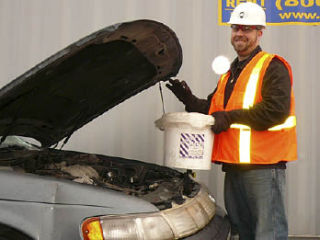Employee Matt Smith at Arrow Metals in Woodinville, Washington, removes a mercury-containing switch from under the hood of (what else?) a Mercury automobile.
OLYMPIA – When Matt Smith removed the convenience light from under the hood of a Mercury (a fitting coincidence) at Arrow Metals in Woodinville, it represented the 100,000th mercury-containing auto switch collected under Washington Vehicle Mercury Switch Removal Program.
Automobile recyclers in Washington have been collecting mercury switches from the hoods and trunks of scrap vehicles since 2006 to prevent the equivalent of 225 pounds of this toxic chemical from entering the environment. This milestone ranks Washington fifth in the nation for recycling mercury-containing auto switches.
If mercury switches are not removed, mercury escapes into the atmosphere as vehicles are crushed and later melted down for re-use.
Mercury can evaporate into the air and then be deposited into water and soil. Fish collect mercury in their bodies. This can then be a source of mercury exposure to people who consume the fish. Children and fetuses are the most vulnerable to the effects of mercury. Exposure can affect learning and behavior later in life.
Washington’s program is a partnership between Ecology, the Automotive Recyclers of Washington Association and End-of-Life Vehicle Solutions, an organization of vehicle manufacturers that no longer use mercury switches.
The statewide program relies on auto recyclers — including dismantlers, wrecking yards and scrap metal processors — who voluntarily remove and properly dispose of switches before sending vehicles to scrap metal recyclers. Auto recyclers participating in the program are reimbursed $3 per switch.
“Many of these older vehicles are being scrapped every day,” said K Seiler, manager of Ecology’s Hazardous Waste and Toxics Reduction Program. “The switch collection program has been proven to be highly effective in keeping mercury out of the environment, which protects the health of our state now and for generations to come.”
“This is a great example of a very successful public-private partnership between the vehicle recycling industry, Ecology and vehicle manufacturers,” said Don Phelps of AAA Auto Wrecking and President of the Automotive Recyclers of Washington.
“Ecology has done a magnificent job of putting this program together, coordinating all the players, and administering the program.
The vehicle recycling industry is eager to participate in these types of programs that are so beneficial for the environment and are also a great win-win for all of the participants,” Phelps added.
The mercury switches are one of the nation’s largest sources of mercury contamination. Mercury light switches were used until 2003 for convenience lights under hoods and in trunks, as well as in anti-lock braking systems.
Ninety-five percent of the 167,000 end-of-life vehicles are recycled in Washington each year. Many useable parts are removed from these vehicles and reused, saving consumers millions of dollars, reducing insurance rates, and protecting the environment in many ways, including reducing our need to import oil and other raw materials to make new parts. All the aluminum, steel and other usable materials from remaining vehicle hulks are recycled into new products to save resources. Vehicles are the most recycled consumer goods in America.
Reducing toxic threats is one of Ecology’s five strategic priorities. Since 2003, the state’s Mercury Chemical Action Plan has prevented the release of approximately 14,300 pounds of mercury into the environment. The plan addresses the elimination, phase-out, collection and recycling of certain mercury-containing products.
Ecology is working in partnership with the state Department of Health, local governments, public health agencies and trade associations to reduce and eliminate those chemicals that pose significant health threats to protect the health of our residents and our environment.
For more information, go to Auto Switches website:
http://www.ecy.wa.gov/mercury/mercury_auto_switches.html.




